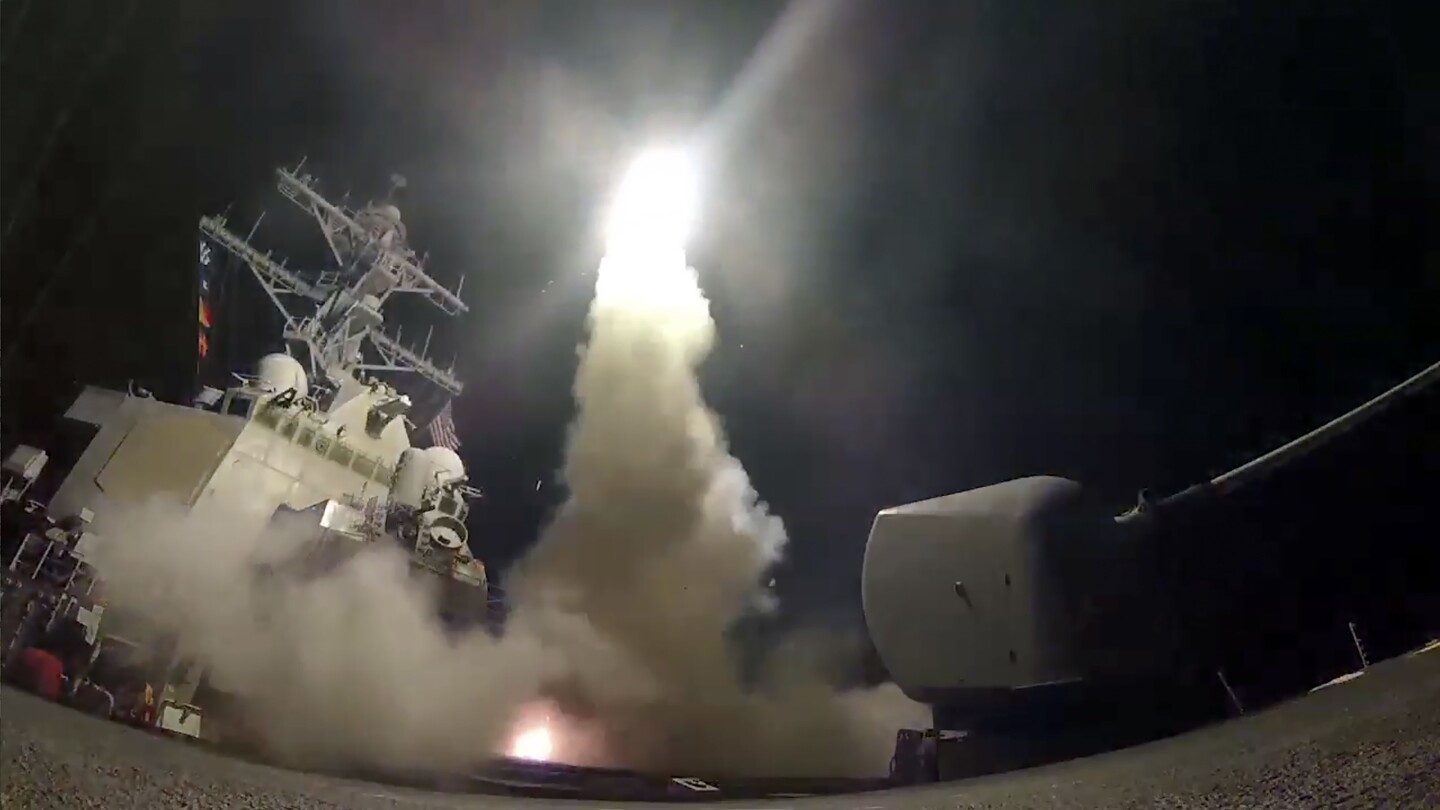Japan’s defense ministry is requesting a nearly 12% budget increase that includes two warships with advanced radar and long-range cruise missiles as it further fortifies the nation’s military in the face of North Korean threats and Chinese military advancement.
The record 7.7 trillion yen ($52.5 billion) request for the 2024 fiscal year marks the second year of a rapid five-year military buildup under a new security strategy Prime Minister Fumio Kishida’s government adopted in December. It focuses on reinforcing strike capability in a break from Japan’s postwar principle of having a military only for self-defense.
Under the five-year plan, Japan plans to spend 43 trillion yen ($315 billion) through 2027 to nearly double its annual spending to around 10 trillion yen ($68 billion), making Japan the world’s third-biggest spender after the United States and China. How to finance and justify the growing military spending is uncertain in a country with steeply declining births and increasing costs of caring for its aged population.
I’m curious if they’ll build any fleet carriers? Large super carriers are a sort of requirement for fighting on the vast Pacific Ocean. Or any ocean really… but especially the biggest (the best ocean)….
They probably won’t for a while. They do, however, have helicopter destroyers that coincidentally support F-35 operations. However, please keep in mind that this isn’t a carrier, but rather a helicopter destroyer. We may also expect to see helicopter cruisers in the future, but that’s TBD.
/s if that wasn’t obvious, they already very much have carriers even if they aren’t exactly Nimitz-class carriers.
helicopter cruisers
Russia’s way ahead of you, with their (semi-mobile) Kuznetsov-class aircraft carrying missile cruiser (no I’m not joking about that name, lol):

See, those are missile tubes in the cough /flight deck/ cough. MISSILE CRUISER!
Do they need to be able to fight across the entire Pacific? Their most likely adversaries are right next door and their most likely ally is the dominant naval power already.
I any money spent on a large carrier would probably be better spent on other things. You can spend 10 billion on a single carrier or get a fleet of ~100 F-35s. I would guess mid-air refueling and more planes will get more sorties over likely targets in a conflict than a carrier would.
I also don’t think carriers are going to be the dominant sea power force in a future peer conflict. I think the submarine will dominate the next war. The carrier will be regulated to power projection after the sea is won and made safe to operate in.
Submarines can’t win a war at sea alone, and we have ASW capable aircraft flying constantly for surveillance against them. We’ve been doing it for more than half a century now.
The reason aircraft carriers became ubiquitous was because aircraft are the most effective means of deploying weaponry. That hasn’t changed. They can also project power inland as well as engaging surface and sub surface craft.
Nothing about warfare technology has been drastically altered enough for submarines to be the primary fighting force. They have a job that they’re damn good at, but aircraft are more multirole and far quicker.
Surveillance, recon and range of weapons has drastically changed. Satellites have the capability to identify a surface fleet and long range weapons are now able to be fired from long distances, find and hit their targets.
I think a couple submarines can effectively negate a carrier task force by just forcing the task force to keep their distance by the threat of a missile launch coming from a patch of seemingly empty see. Any surface ship hunting them is at risk of suddenly becoming the hunted themselves by the submarine or by any land based defense system that are in range.
We employ helicopters and fixed wing to monitor, hunt, and if need be, destroy submarines. Destroyers are also competent submarine hunters.
Nothing about what you’ve said is inherently “false”, but you’re not accounting for the ways we fight submarines (mostly aircraft.) Cruise missiles and boomer submarines are a threat, but the technology has been around for long enough that if subs were to become some super weapon because of it we’d have seen it by now. They serve their purpose well, and we have more than a few ways to defend against them (once again, mostly the aircraft from those carriers you insist on pretending are going the way of the battleship.)
Go look up the history of Naval ASW, from the VPB squadrons that flew Pioneers and Catalina’s in WW2 to the modern platforms that VP and HSM squadrons use. It’s a really interesting progression of technology.
For every one deployed warship, you need two more transiting for resupply or in dock for refit. Their budget probably can’t withstand three fleet carriers, but it could probably withstand three more assault carriers armed with STOL F-35s.
Edit: Though, Japan calls them destroyers for hand-wavy ‘we only have a self-defense force’ reasons.
This is the best summary I could come up with:
TOKYO (AP) — Japan’s defense ministry is requesting a nearly 12% budget increase that includes two warships with advanced radar and long-range cruise missiles as it further fortifies the nation’s military in the face of North Korean threats and Chinese military advancement.
How to finance and justify the growing military spending is uncertain in a country with steeply declining births and increasing costs of caring for its aged population.
Japan earlier had ordered the SPY-7 for land use but was forced to scrap the plan due to safety concerns in the regions that would host them.
In the 2024 budget request, the Defense Ministry is seeking 755 billion yen ($5.17 billion) to develop and acquire “standoff” capability to strike distant targets, especially for the defense of Japan’s southwestern islands, the area feared to become the frontline in case of a Taiwan emergency.
For overall missile defense, the ministry requests 1.27 trillion yen ($8.69 billion) for spending that incudes the Aegis-equipped warships.
Japan’s government is preparing to ease its arms transfer policy, which currently bans export of lethal weapons, to allow some of them.
The original article contains 628 words, the summary contains 183 words. Saved 71%. I’m a bot and I’m open source!






